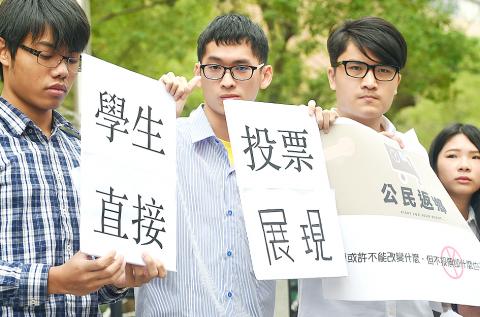College students launched a crowdfunding campaign to charter buses to take students home to vote for the presidential and legislative elections on Saturday, saying the campaign would help young people participate in democracy and exercise their rights.
Student association leaders from National Taiwan, National Chengchi and National Yang-Ming universities as well as Mackay Medical College yesterday told a news conference in Taipei that they raised funds to pay for students to travel home so they can to boost voter numbers.
A majority of college students study away from home and the cost of bus fare and travel time could deter people from going home to vote. The campaign was organized to help young people exercise their political rights, the leaders said.

Photo: Liao Chen-huei, Taipei Times
“It is a display of direct democracy that students go home and vote. It allows young people to express their voice and exercise their rights,” National Chengchi University student association president Chen Yi-lin (陳億霖) said.
About 145 charter buses with a total capacity of 2,500 seats have been offered free of charge or at a discounted price to students at various locations. Buses are scheduled to depart on Friday after the exam week, Chen said.
The campaign expanded on a similar 2014 crowdfunding campaign organized by Taiwan Citizen Union that financed students to return home and vote. This year’s campaign is expected to see a 10 percent increase in the number of voters who return home, Chen said.
National Yang-Ming University student association president Chen Chia-ching (陳佳菁) said that Taiwan has 18.81 million registered voters and 5.11 million of them are aged between 20 and 34, while first-time voters account for 6.8 percent of total voters, making the younger voter group a key player in determining election outcomes.
Asia University student and member of the Independent Youth Front Liu Hui-chung (劉惠中) said about six out of 10 voters aged between 20 and 40 turned out for the last election, but young voter turnout increased to more than 70 percent in the nine-in-one elections in 2014, and the 10 percent increase was what overturned the traditional political territory.

Alain Robert, known as the "French Spider-Man," praised Alex Honnold as exceptionally well-prepared after the US climber completed a free solo ascent of Taipei 101 yesterday. Robert said Honnold's ascent of the 508m-tall skyscraper in just more than one-and-a-half hours without using safety ropes or equipment was a remarkable achievement. "This is my life," he said in an interview conducted in French, adding that he liked the feeling of being "on the edge of danger." The 63-year-old Frenchman climbed Taipei 101 using ropes in December 2004, taking about four hours to reach the top. On a one-to-10 scale of difficulty, Robert said Taipei 101

Nipah virus infection is to be officially listed as a category 5 notifiable infectious disease in Taiwan in March, while clinical treatment guidelines are being formulated, the Centers for Disease Control (CDC) said yesterday. With Nipah infections being reported in other countries and considering its relatively high fatality rate, the centers on Jan. 16 announced that it would be listed as a notifiable infectious disease to bolster the nation’s systematic early warning system and increase public awareness, the CDC said. Bangladesh reported four fatal cases last year in separate districts, with three linked to raw date palm sap consumption, CDC Epidemic Intelligence

Two Taiwanese prosecutors were questioned by Chinese security personnel at their hotel during a trip to China’s Henan Province this month, the Mainland Affairs Council (MAC) said yesterday. The officers had personal information on the prosecutors, including “when they were assigned to their posts, their work locations and job titles,” MAC Deputy Minister and spokesman Liang Wen-chieh (梁文傑) said. On top of asking about their agencies and positions, the officers also questioned the prosecutors about the Cross-Strait Joint Crime-Fighting and Judicial Mutual Assistance Agreement, a pact that serves as the framework for Taiwan-China cooperation on combating crime and providing judicial assistance, Liang

US climber Alex Honnold left Taiwan this morning a day after completing a free-solo ascent of Taipei 101, a feat that drew cheers from onlookers and gained widespread international attention. Honnold yesterday scaled the 101-story skyscraper without a rope or safety harness. The climb — the highest urban free-solo ascent ever attempted — took just more than 90 minutes and was streamed live on Netflix. It was covered by major international news outlets including CNN, the New York Times, the Guardian and the Wall Street Journal. As Honnold prepared to leave Taiwan today, he attracted a crowd when he and his wife, Sanni,